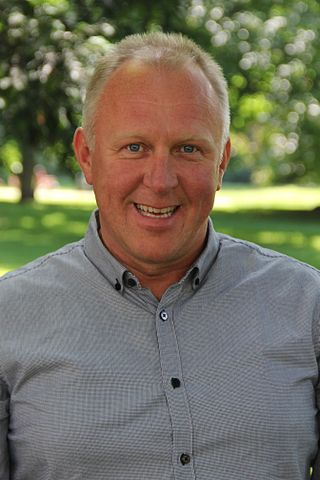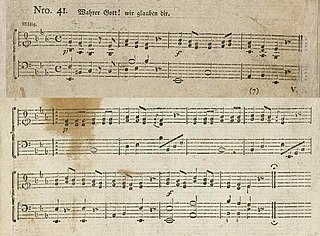
"Gott sei gelobet und gebenedeiet" is a Lutheran hymn of 1524 with words written by Martin Luther who used an older first stanza and melody. It is a song of thanks after communion. Luther's version in three stanzas was printed in the Erfurt Enchiridion of 1524 and in Johann Walter's choral hymnal Eyn geystlich Gesangk Buchleyn the same year. Today, the song appears in German hymnals, including both the Protestant Evangelisches Gesangbuch, and in a different version in the Catholic Gotteslob.

Helmut Alfons Schlegel is a German Franciscan, Catholic priest, meditation instructor, author, librettist and songwriter. He is known for writing new spiritual songs, set to music by various composers.

Neues Geistliches Lied, abbreviated NGL, is a music genre of songs in German intended for church usage, and based on contemporary lyrics and with music by contemporary composers.

Eugen Eckert is a German social worker, minister, singer-songwriter and academic teacher. He is known for his lyrics for new spiritual songs, and his oratorios and musical plays.

Patrick Dehm is a German Catholic theologian, supervisor and clinical Gestalt therapist. He and his brother founded the Eugen Dehm foundation, supporting a holistic health concept, in memory of their father.
"Ob ich sitze oder stehe" is a Christian poem by Eugen Eckert, written in 1988, and made a hymn of the genre Neues Geistliches Lied with a melody and setting by Torsten Hampel the same year. It is based on Psalm 139. The song is also known by its refrain "Von allen Seiten umgibst du mich". It is included in song books and the Catholic hymnal Gotteslob.

""Wahrer Gott, wir glauben dir" is a Catholic hymn. Christoph Bernhard Verspoell (1743–1818), a cleric from Münster, wrote text and melody, and published it in 1810 in his hymnal Orgelbegleitung zu den Gesängen beym Römisch-kathol. Gottesdienste. Herausgegeben von C. B. Verspoell. The song in two stanzas has remained in the repertory of church hymns, used mainly during Eastertide, but also for communion and funerals. It appears in several regional sections of the Catholic hymnal Gotteslob, as GL 770 in Cologne, as GL 780 in Limburg and Münster, and as GL 783 in Speyer, among others.

"Seht, er lebt" is a Christian poem written by the Catholic priest Lothar Zenetti in 1973. With an Israeli melody, it became an Easter hymn in the Neues Geistliches Lied (NGL) genre, first published in 1975. In the 2013 Catholic hymnal Gotteslob, it appears as GL 781 in the regional section for the Diocese of Limburg.
"Einer ist unser Leben" is a poem in five stanzas, written by Lothar Zenetti in 1973. It became a Christian hymn of the genre Neues Geistliches Lied (NGL) with a 1971 melody by Jean Liesse. The song is part of many hymnals, both Catholic and Protestant, and of songbooks, remaining popular in the 21st century.
"Herr, wir bringen in Brot und Wein" is a Christian offertory hymn with German text by Hans Bernhard Meyer, and a melody by Peter Janssens. The song, of the genre Neues Geistliches Lied (NGL), is part of German hymnals, including Gotteslob, and songbooks.

"Lamm Gottes, für uns gegeben" is a Christian hymn in German with text by Eugen Eckert and a tune by Horst Christill. It is of the genre Neues Geistliches Lied. The song reflects the liturgical Agnus Dei. It is part of regional sections of the common German Catholic hymnal.

"Seht, der Stein ist weggerückt" is an Easter hymn in German with text written by the Catholic priest Lothar Zenetti in 1971. With a 2011 melody by Josef Oestemer, it became a Neues Geistliches Lied (NGL) published in 2013 in the Catholic hymnal Gotteslob, as GL 783 in the regional section for the Diocese of Limburg.
"Nimm, o Gott, die Gaben, die wir bringen" is the beginning of a Christian offertory hymn with German text by Raymund Weber, and a melody that Andrew Lloyd Webber composed for his musical Jesus Christ Superstar. The song, of the genre Neues Geistliches Lied (NGL), is part of German hymnals, including Gotteslob. Two other songs use the same melody.
"Hilf, Herr meines Lebens" is a Christian hymn, with a text mostly written in 1961 by Gustav Lohmann, and a melody composed the following year by Hans Puls. The song, of the genre Neues Geistliches Lied (NGL), is part of German hymnals, including Gotteslob, and songbooks. It begins: "Hilf, Herr meines Lebens, dass ich nicht vergebens hier auf Erden bin".
Habakuk is a German pop band from Frankfurt, formed in 1975. The group is focused on new Christian music of the genre Neues Geistliches Lied.

"Nahe wollt der Herr uns sein" is a Christian hymn with German text, translated in 1971 from a 1964 Dutch hymn by Huub Oosterhuis. Its refrain says that God is among people but not recognised. The song, of the genre Neues Geistliches Lied (NGL), appeared from 1975 in German hymnals, then in the common section of the Catholic Gotteslob. In the hymnal's second edition, it appeared only in regional sections.

"Bewahre uns, Gott" is a Christian hymn with text by Eugen Eckert to a melody from Argentina, of "La paz del Señor". The song of the genre Neues Geistliches Lied, a prayer for protection in hard times, is contained in several hymnals and songbooks ecumenically. Several of these list it as "Bewahre uns, Gott, behüte uns, Gott"
"Segne, Vater, diese Gaben" is a Christian hymn. The authors of text and melody are unknown. It is meant to be sung as a round. The song, which is often used for a prayer before a meal, has appeared in German hymnals and songbooks. It is regarded as a song of the genre Neues Geistliches Lied (NGL), and has been used in schools and events for young people.

"Wäre Gesanges voll unser Mund" is a Christian hymn with text by Eugen Eckert, written in 1999, and a melody by Alejandro Veciana. The text is derived from a Jewish text. A hymn of the genre Neues Geistliches Lied, it is part of regional sections of the common German Catholic hymnal Gotteslob, and of other songbooks.









